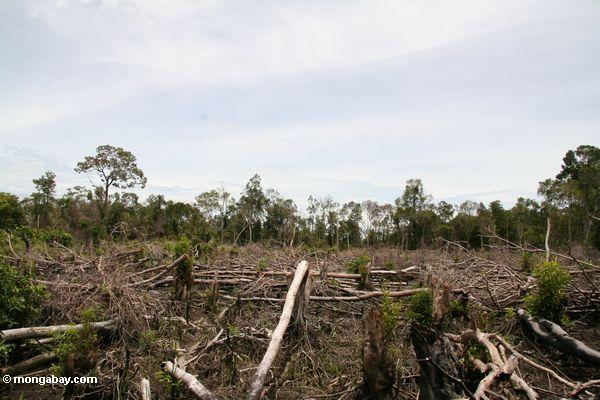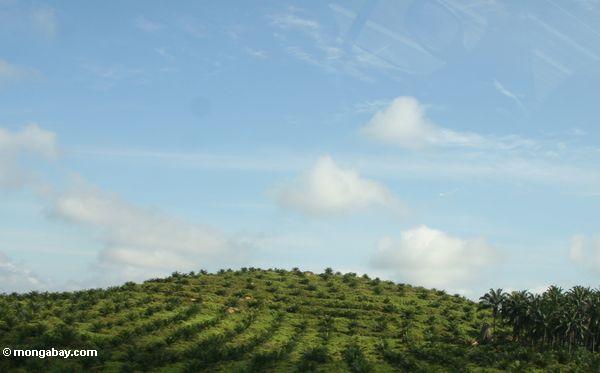|
|

|
|
The Adventures of Mongy the Bay Frog Chapter 4: In which I stumble over Rhett in the jungle and we learn about Palm Oil By Christa Maas The ceiling fan above my head was doing its best to try to keep me cool. It had made a clanking noise all night, but I had slept reasonable well in the hot, humid air typical of the tropical climate in Borneo. Clank, clank, hop, hop, clank, hop, clank, hop, hop... There was a different sound mixed in with the already familiar noise of the fan and it woke me up that morning, just before sunrise. "Mongy let me sleep!" I begged "Stop hopping up and down on top of the blades!" Mongy jumped down and landed comfortably on top of my chest. "But it's important!" he insisted. "What is important?" I mumbled sleepily and just about as interested in the subject as I could possibly be at 4:30 AM. "I need to ask Ringo some more questions." replied my determined little amphibian friend. He had not stopped talking about Ringo Tang, our new found Orangutan friend since we had left the jungle the night before and I knew there would be no more sleep for me that morning. So I got up reluctantly and headed for the shower. For those who have never been eco-travelers I'd like to point out that ceiling fans and a hot shower are the ultimate luxury and I definitely wanted to enjoy them before heading back to the jungle. Meanwhile Mongy sat there enjoying the steam that came from my hot shower and almost managed to keep his impatience under control. —Well, almost: "Are you ready yet?" he asked me over and over. "Can we go now? Finally?" he kept probing until I had gulped down a really much too hasty breakfast. "Don't forget my fish food cookies!" he reminded me, and off we were to Tanjung Puting National Park again to meet with Ringo Tang. Ringo was already sitting on top of the feeding platform enjoying his breakfast of Rambutan fruit and bananas, taking his time and eating calmly. He was totally ignoring Mongy who started nagging him as well: "Are you finished yet?" Mongy started hopping around and Ringo winked at me and smiled: "Ah, kids!" A couple of young Orangutans were cheerfully swinging from branch to branch and started to poke the bouncing little frog with great curiosity. Now, that was too much for Mongy! He quickly took refuge inside my backpack, peeking out carefully and suspiciously from time to time. "Ringo, I want to ask you something" said a muffled little voice from behind the flaps of one of the deeper pockets. "and it's very important". I want to know about Palm Oil plantations. Why do they destroy the jungle to plant stupid trees like that? You said that it’s for money, but I don't understand!" 
Mongy hates it when he doesn't understand. "Well" said Ringo "I am only an Orangutan and what you are asking me only a really smart human would know. But there is such a human in Borneo right now and if we ask all my jungle friends for help, I am sure we can find him." I couldn't imagine who this human might be, but I had already learned that animals are wise and know friends of the environment and I am a lot like Mongy when it comes to curiosity. So, off we went, ready for a long hike into the jungle. If you have ever done this, you will know it about ticks, mosquitoes, leeches, blisters, machetes, thick foliage, poisonous plants and animals and many other dangers that lurk in the jungle. The heat can dehydrate you very fast and will really exhaust you. Mongy of course had no complaints. He was comfortable either in the back pocket of my knapsack or bouncing up and down on top of my hat. He is at home in the tropics and the climate suits him just fine. We had travelled for a few hours when we came to a small clearing with a burbling little creek and a nice little waterfall. I stumbled towards it, really looking forward to refreshing myself when Ringo shouted "Careful, don't trip over him" Too late. I landed flat on my face, right next to a camouflaged guy with a camera. "HI" I said flabbergasted. "Hi" he responded equally surprised. "I didn't know you were in Borneo, Christa." I got up, stretched my aching bones and took a good look at him. Rhett Butler! "Then you must be the person Ringo wants us to meet. We have been tracking you all morning, although I didn't imagine running into you quite like this! Oh, I am sorry, this is Mongy the Bay Frog and I think you and Ringo Tang have met?" Before Rhett could answer, Mongy, who had been thrown off my hat came leaping towards him, and said with great urgency: " I really need to ask you something important and it's about Palm oil and I have waited all morning and didn't even have breakfast and now I can't wait any longer!" "Mongy! Where are you manners" I chided him. But Rhett just smiled and said; "Yes, Mongy the Bay Frog, I understand your impatience. This is really an urgent matter. Not only for Borneo, but for your own tropical country, Brazil as well! Sit down Mongy and Christa. Hi, Ringo, it's nice to see you again! Let me tell you about Palm Oil: "Certain types of palm trees produce large red fruit which are rich with oil. After refining, this oil, known as palm oil, it can be used to produce all sorts of products, including oils used in foods like chocolates and cookies, cosmetics like makeup, and even biodiesel, a fuel that can be used in cars instead of diesel (gasoline)." "Oil palms, as these trees are called, have very high oil yields -- some of the highest of any crop used for biofuel (plant-based fuel) production. A single hectare (2.5 acres) can produce up to 7 tons of oil, many times what would be produced from the same area of corn, soy, or canola." "Given its high yield and the many uses for its oil, it may seem that oil palm is a great solution to dwindling supplies of fossil fuels and concerns about global warming (the burning of fossil fuels is a major contributor of greenhouse gases to the atmosphere). However, there are problems is some places where palm oil is being produced, specifically here in the tropical rainforests of Malaysia and Indonesia." "About 88 percent of global palm oil production was in Malaysia and Indonesia in 2007. Although much of this production took place on land long ago established for agriculture, some of it occurred in areas that were newly cleared specifically for oil palm cultivation." "The most threatened ecosystems by expansion of oil palm plantations are rainforests and peat lands. Peat lands are swampy areas where the soils are made of peat — decomposed vegetation. Peat acts as a sponge, soaking up water and helping prevent floods. It also stores large amounts of carbon." "When peat lands are drained, the stored carbon reacts with air to release carbon dioxide into the atmosphere, increasing concentrations of the greenhouse gas. The dry peat then becomes highly flammable, increasing the risk of large-scale fires when plantation developers use fire to clear land and burn agricultural waste." "Greenhouse gas emissions also result when rainforest is cleared for oil palm plantations. Worse, oil palm plantations support very low levels of biodiversity..." "What's a bio-diver-city?" asked Mongy. It's pronounced biodiversity, with an "s", Mongy, its all the different plants and creatures that live and grow in the jungle , and what this means is that most of these plants and animals once found in the rainforest must either move or perish. Oil palm plantations are not good for wildlife and endangered species like Ringo and his family, the orangutans, or the Sumatran rhino, the pygmy elephant of Borneo, and the Sumatran tiger. They are all threatened by development for oil palm. "But what can we do about it?" asked Mongy. Rhett continued: "The first thing you can do is be aware of palm oil and its impact on the environment. Look at the labels of household products and packaged foods to see if they contain palm oil (however palm oil is often not labeled as an ingredient). You may soon see that palm oil is all around us. 
Palm oil isn't going to go away, but consumer pressure on the industry will help force the industry to reduce its impact on the environment. Already some industry leaders are working to develop "sustainable palm oil" that meets certain criteria to ensure that its production did not result in deforestation or hurt wildlife. Once such standards are in place (possibly in late 2008), consumers may be able to choose products made from environmentally-friendly palm oil. These products should be supported to encourage the entire industry to shift towards "greener" palm oil. Another way you can help is to support organizations working to protect orangutans and other wildlife in their native habitat. For example, Orangutan Foundation International [article] and the Borneo Orangutan Survival Foundation are two such groups." "That's the professor!" said Ringo all excited. "She saved my life! She's my hero." Rhett had finished telling us all he knew about Palm Oil and Mongy was satisfied. We talked a lot about the importance of letting children in Mongy's Brazil know about all of this. Rhett explained to Mongy that he was an environmental journalist on a photo shoot for his ecological website www.mongabay.com. He is very dedicated and works hard to save the remaining rainforests and their dwindling biodiversity. "Just like my name" said a very delighted Mongy "Error! Hyperlink reference not valid. he giggled. I want to work on your site, too!" "You already are" laughed Rhett. "Christa and I are publishing your stories there so all the kids in the world can read them" "Yuhu! " said Mongy. "I am the most famous environmental journalist's bay frog in the world!" "Oh boy" I sighed "There he goes bouncing around again!" Mongy continued his usual ruckus and after he finally quieted down became very thoughtful. " Christa, I have a question" he sighed with the most troubled look on his face: "Christa, do fish food cookies contain Palm Oil?" "No, Mongy, they don't. You know I always read all the labels!" "Oh thank goodness. I was really getting worried!" NEXT Chapter 1: Meeting Mongy the Bay Frog Chapter 2: Mongy the Bay Frog's Family Chapter 3: Mongy the Bay Frog's meets Ringo the orangutan Chapter 5: Where Mongy talks to a tree |
 |
The Adventures of Mongy the Frog
|
|
|
|
worldrainforests.com/kids is published under a creative commons license.  
©2010 mongabay.com |
